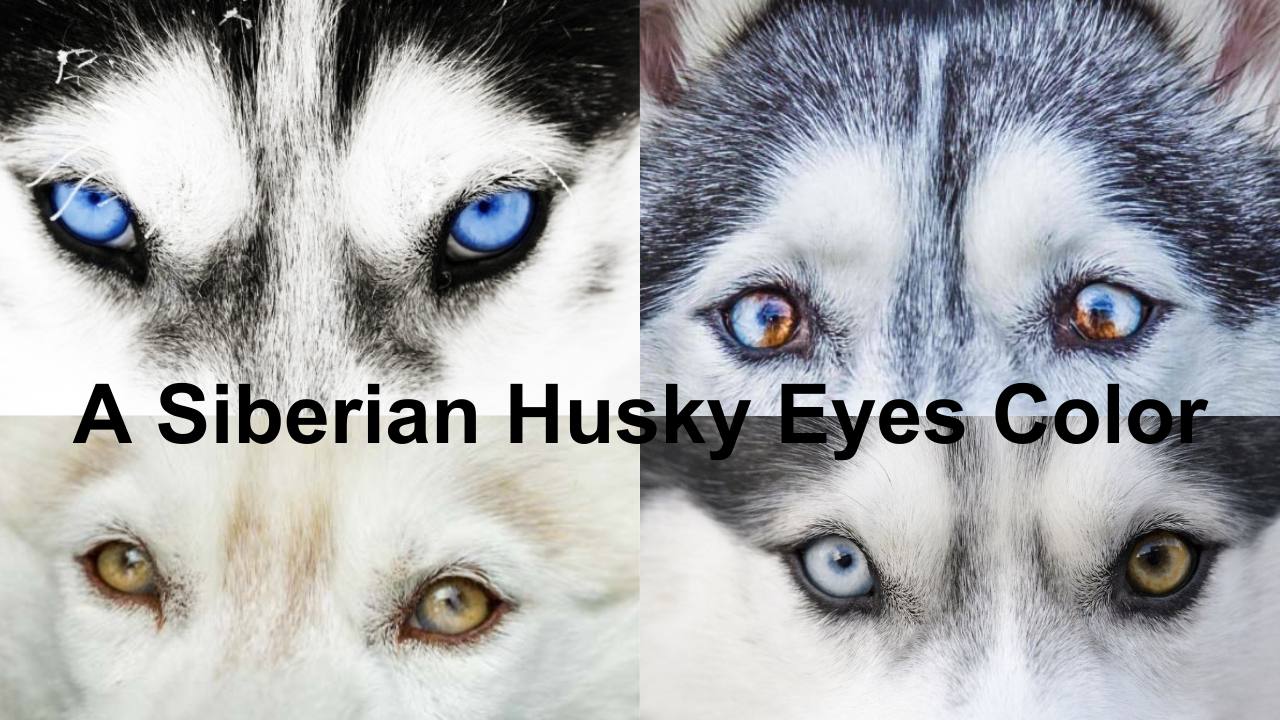Siberian Huskies are known for their striking and captivating appearance and their piercing eyes are a key element of their charm. The Siberian husky eye colors are usually associated with deep blue colors but can a Siberian Husky have black eyes? In this detailed guide you’ll learn everything you need to know about husky eye color.
- Understanding the Siberian Husky eye color:
- Possibility of Black Eyes in Siberian Huskies Dog:
- Other Uncommon Husky with different Colored Eyes:
- Common Eye Changes Colors in Siberian Huskies Dog:
- Factors Influencing Husky Puppies Eyes Changes the Color:
- The Fascination with Husky Eye Color:
- Eye Problems in Siberian Huskies:
- Conclusion:
- Frequently Asked Questions:
Understanding the Siberian Husky eye color:
Before we delve into the topic of black eyes in Siberian Huskies let’s understand the eye color of the husky. Siberian Huskies are known for their mesmerizing eyes which come in different shades. The most common eye color of a husky is blue. However, the Siberian Husky eye color can range from light blue to deep blue.
Common Husky Eye Colors:
1. Blue eyes: most Siberian Huskies have distinctive blue eyes associated with the breed.
2. Brown eyes: although less than blue eyes brown eyes are seen in Huskies especially in puppies.
3. Heterochromatic eyes: some Huskies have heterochromia where one eye is blue and the other is brown. This distinctive feature is very popular among Husky lovers.
4. Particulate eyes: Particulate eyes means that one eye has two different colors. The usually is a combination of a blue-eyed Husky and a brown-eyed Husky.
5. Green eyes: although not as common as blue or brown eyes some Huskies can have green eyes.
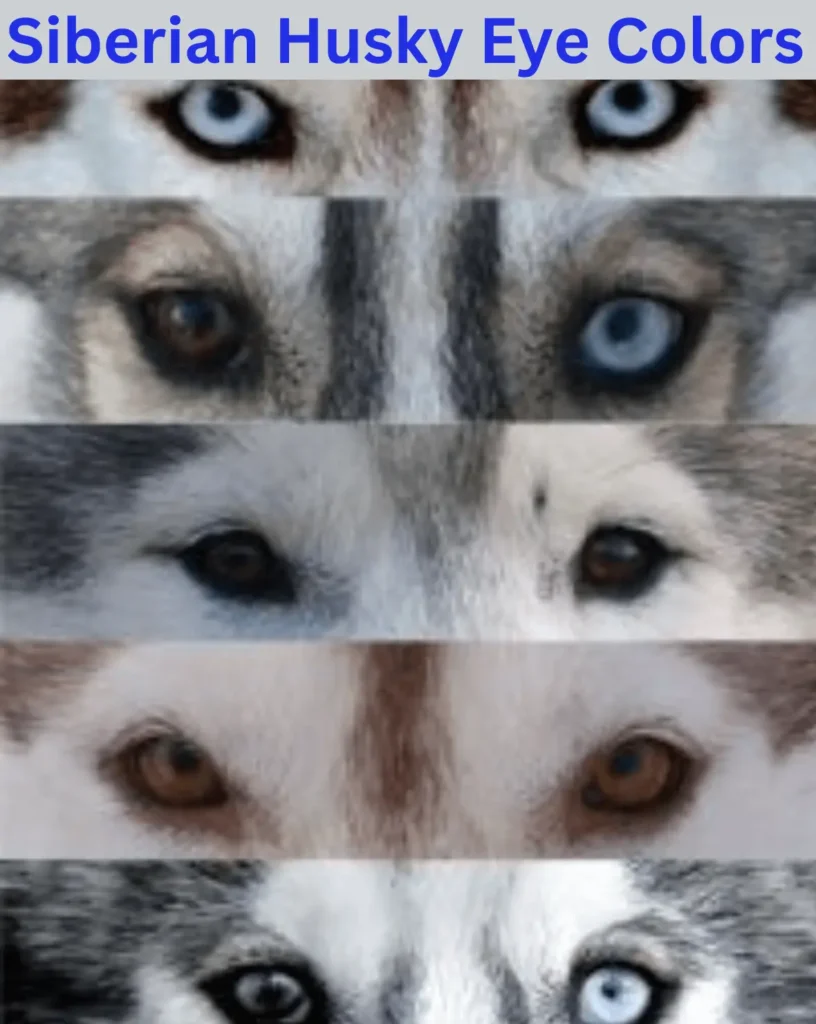
Can a Siberian Husky Have Black Eyes:
Now let’s answer a fascinating question: can a Siberian husky have black eyes? To answer this question we need to take a closer look at the genetic factors that determine the color of a husky’s eyes.
Genetics of Husky Eye Color:
The color of a husky’s eyes is mainly influenced by genetics. The genes responsible for husky eye color are known as B-locus. These genes regulate the production of pigment in the iris which ultimately determines eye color. The two types of Siberian Husky eye color are eumelanin (black) and pheomelanin (yellow/red). The interaction of these pigments leads to different Siberian husky eye colors.
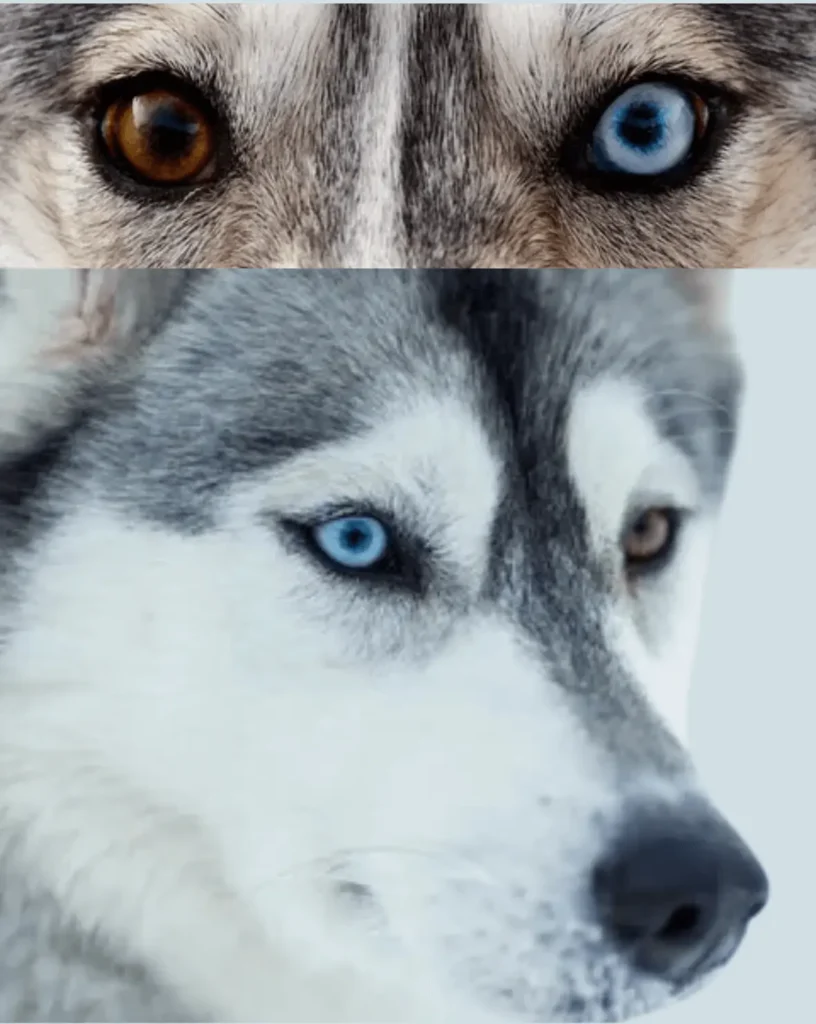
Possibility of Black Eyes in Siberian Huskies Dog:
Although black eyes are very rare in Siberian huskies and they are not completely impossible. To see a husky with black eyes certain genetic combinations must occur. This is due to a certain combination of genes that produce a high concentration of eumelanin in the iris.
Factors contributing to black eyes in Huskies:
Genetic variations: mutations or genetic variations can lead to an overproduction of eumelanin in the iris causing black eyes.
Rarely: this trait may occur in huskies crossed with other dog breeds carrying black-eyed genes.
Age: Some huskies may be born with light eyes that darken with age and may appear black under certain lighting conditions.
Other Uncommon Husky with different Colored Eyes:
The black eyes are a rarity in huskies but in this dog breed has several other unusual eye colors.
Red Eyes:
In very rare cases, huskies can have red eyes. This is usually caused by a genetic mutation that results in a lack of pigment in the iris and, as a consequence, visible blood vessels underneath.
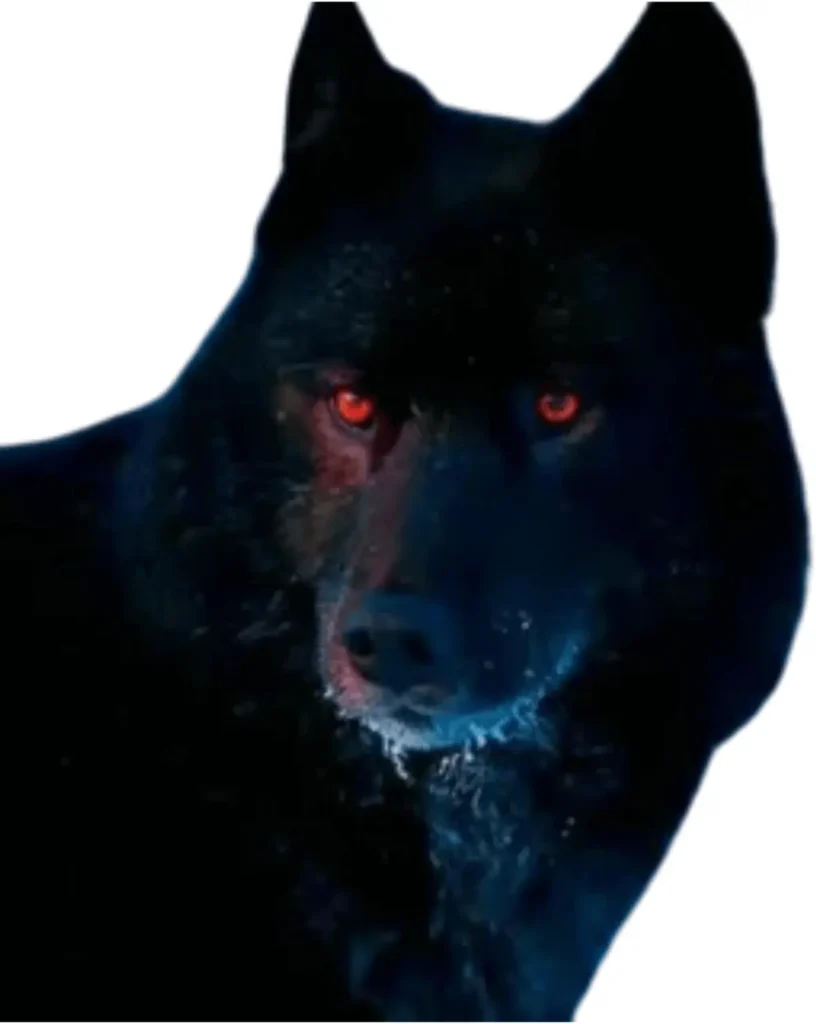
Green Eyes:
Green eyes, although not common but do occur in Siberian Huskies. These eyes are usually the result of a combination of blue and brown pigments resulting in a greenish tint.
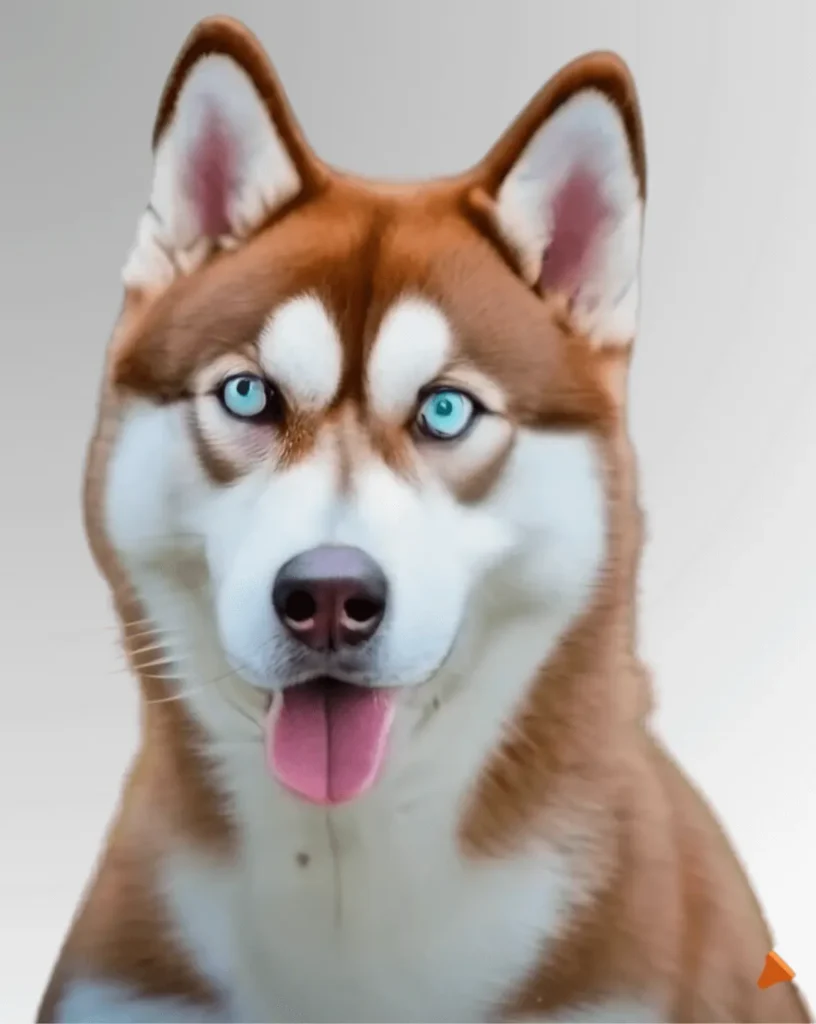
Blue and Brown:
Some Huskies have one blue and one brown eye which is called heterochromia. This fascinating feature is sought after by many husky lovers and adds to their appeal.
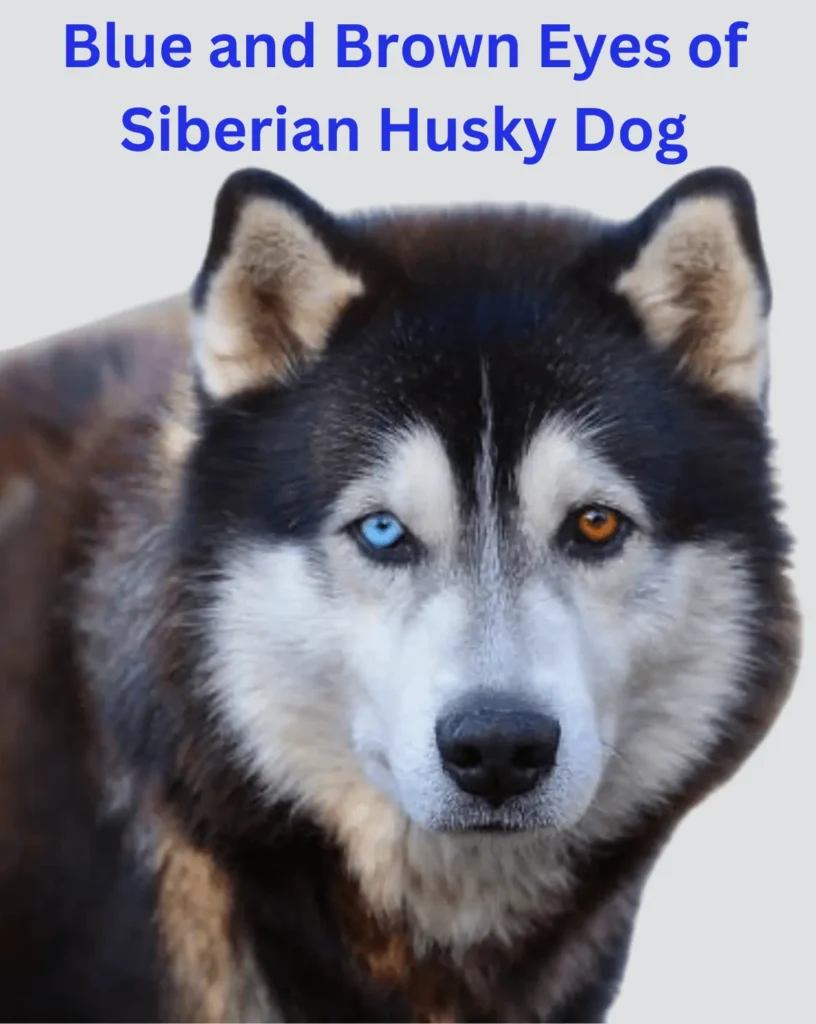
Common Eye Changes Colors in Siberian Huskies Dog:
Huskies are known for their unique ability to change eye color throughout their lives. This phenomenon is especially noticeable in baby Huskies.
Husky Puppies change eye color:
Most husky puppies are born with blue eyes. However, their eye colour often changes as they grow up. This change is due to the gradual development of pigment in the iris.
Why do Husky Puppies change eye color:
Husky puppies are born with relatively poorly developed eye pigment so they usually have blue eyes at birth. As they grow, the ratio of eumelanin to pheomelanin in the iris changes causing the eye color to change.
Factors Influencing Husky Puppies Eyes Changes the Color:
Several factors can influence the timing and extent of eye color changes in Husky puppies:
Genetics:
A husky’s genetic heritage plays an important role in determining when and how Siberian Husky eye color changes. Some huskies can maintain their blue eye color throughout their lives while others may change to hazel or other colors.
Age:
The most dramatic eye color changes in husky puppies usually occur during the first few months of life. However, minor changes may continue into adulthood.
Health:
The timing and extent of Siberian Husky eye color changes can also affect a husky puppy’s overall health and well-being. A healthy diet and lifestyle can encourage normal development.
Sunlight:
Exposure to sunlight can affect the intensity of eye discoloration in husky dogs. Sun exposure can stimulate melanin production which can lead to darkening of the Siberian Husky eye color.
The Fascination with Husky Eye Color:
The ever-changing eye colors of the Siberian Husky have captured the attention of dog lovers and breed enthusiasts worldwide. The mystery of how Huskies can have black or unusually colored eyes adds to the fascination with the breed.
Eye Problems in Siberian Huskies:
There is an interesting variety of eye colours in Huskies but it is important to take into account the eye problems that can occur in this breed. Like all dog breeds Huskies are prone to certain eye diseases that require attention and care.
Common Husky Eye Problems:
Cataracts: If left untreated, huskies can develop cataracts a clouding of the lens of the eye that can lead to vision problems.
Corneal dystrophy: This disease can cause clouding of the cornea and impaired vision.
Progressive retinal atrophy (PRA): PRA is a genetic eye disease that can lead to blindness in Siberian Huskies.
Glaucoma: Glaucoma is an increase in intraocular pressure that can damage the optic nerve and lead to vision loss.
Entropion: Some Huskies can develop entropion in which the eyelids turn inward and irritate the cornea.
Read Also: A Black Siberian Husky Breed and Colors
Conclusion:
Siberian Huskies are known for their mesmerizing eyes. The most common and iconic color of which is blue. Although black eyes are extremely rare in Huskies they are not entirely impossible and are usually caused by some genetic variation. The fascinating world of Siberian Husky eye color includes many variations from blue to brown to heterochromatic green and even red eyes.
The fact that the eyes of husky puppies can change color gives this breed an even greater appeal. Although Siberian Husky eye color variations are an interesting aspect of the breed it is important to be aware of potential eye problems that can occur in huskies and to ensure that they receive proper care and attention for their visual health.
Whether you are a husky owner or simply an admirer of these majestic dogs, the variety of Siberian Husky eye colors is a testament to the beauty and complexity of nature. So the next time you look into the eyes of a Siberian husky, remember that a story as unique and fascinating as the dog itself can be told around its eyes.
Frequently Asked Questions:
Can Siberian Huskies have black eyes?
Yes, Siberian Huskies can have black eyes, but it is important to clarify what “black eyes” means in this context. When we talk about black eyes in Siberian Huskies, we usually mean black or dark brown pigmentation around the edges of the eyes, which is more common in blue-haired Huskies.
Are black eyes the breed standard for Huskies?
No, black eyes are not a recognised breed standard for Siberian Huskies. The American Kennel Club (AKC) and other breed standards do not specify black eyes as an acceptable breed colour. According to these standards, Siberian Huskies should have blue or brown eyes, although variations and combinations are acceptable.
What are the causes of black eye pigmentation in Huskies?
The dark pigmentation around the eyes of huskies is genetic. It is most common in huskies with blue eyes, but can also occur in huskies with other eye colours. The pigmentation is thought to be due to the same genetic factors that cause blue eye colour.
Are there different shades of black eye pigmentation?
Yes, the shade of black eye pigmentation can vary depending on the breed of husky. Some have very dark black pigmentation, while others may have a lighter or browner colour. These differences are normal and do not indicate health.
Can I improve or reduce the pigmentation of dark circles?
Black iris pigmentation is a genetic trait and cannot be improved or reduced by external means. It is not recommended to alter the natural pigmentation of the hazel eyes in any way as this can cause eye damage or discomfort.
Do black huskies need special care?
There are no special care requirements for black huskies compared to other eye colours. All Siberian Huskies need a balanced diet, regular exercise, brushing and regular veterinary care. It is important to ensure that your husky is properly cared for, regardless of its eye colour.
How Can I Care for a Husky with Black Eyes?
Caring for a Husky with black eyes is similar to caring for any other Husky. Here are some essential care tips:
Proper nutrition: consult your veterinarian to determine portion sizes and dietary requirements.
Regular exercise: Huskies are an active breed and need daily exercise to keep them healthy and happy. Be sure to participate in activities such as brisk walks, jogging and playtime.
Grooming: The Siberian Husky has a thick double coat that sheds seasonally. Regular brushing and occasional bathing will help keep the coat clean and healthy.
Training and Socialization: Start training and socializing your Husky at an early age to help he become a well-mannered and confident dog.
Health. Monitor eye health as the Husky may be prone to some vision problems.
